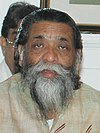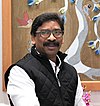|
Jharkhand Mukti Morcha
Jharkhand Mukti Morcha (JMM; lit. 'Jharkhand Liberation Front') is a political party in the Indian state of Jharkhand which was founded by Binod Bihari Mahato.[8] Shibu Soren is the president of the JMM. JMM is also an influential political party in the state of Odisha and parts of neighbouring of states. Its election symbol for Jharkhand is Bow and Arrow.[9] The party was officially created on the birthday of Birsa Munda, the 19th-century tribal warrior of Jharkhand, who fought against the British rule in present-day Jharkhand.[10] The State of Jharkhand also came into existence on Birsa Munda's birthday in 2000.[11] FormationFor almost six decades the movement to separate Jharkhand from Bihar had been attempting to gain a foothold. The Jharkhand Party gained political strength but commissions examining the demands for a separate Jharkhand State consistently rejected its demands. Before 1962, the Jharkhand Party held between 23 and 32 seats in the Bihar Legislative Assembly. In 1962, it won 20 seats. Jaipal Singh Munda merged the Jharkhand Party with the Indian National Congress in 1963 and became a minister in Vinodanand Jha's government in Bihar. But other members did not join the Congress.[12] In the 1967 general election, the party had a very poor showing with only eight Assembly seats. The party soon split into several splinter parties each claiming to be the real Jharkhand Party.[13] These included the Jharkhand Party led by N. E. Horo, the Jharkhand Party led by Naren, and the All India Jharkhand Party led by Bagun Sumroi. There was also the Hul Jharkhand Party led by Justin Richard, which further fragmented and became the Bihar Progressive Hul Jharkhand Party led by Shibu Soren. Jharkhand Mukti Morcha was founded by Soren, Binod Bihari Mahato and Marxist Co-ordination Committee leader A. K. Roy. The party was officially created on the birthday of Birsa Munda, a 19th-century tribal warrior from Jharkhand, who fought against British rule in the region.[14] On 4 February 1973, Mahato became president of the party and Soren became its general secretary. Prominent party leaders at that time included Roy, Nirmal Mahto and Tek Lal Mahto, among others. Early yearsIn its early years, the JMM under Soren's leadership brought industrial and mining workers who were mainly non-tribals belonging to the Dalit and backward communities such as Surdis, Doms, Dusadh, Kurmi, Koiri, Gowala, and Teli into its fold. However Soren's association with the late politician Gyanranjan brought him close to the Prime Minister Indira Gandhi. He won the Dumka Lok Sabha seat in 1972. Irked by Soren's association with the Indian National Congress, a few younger members of the JMM banded together in Jamshedpur and set up the All Jharkhand Students Union (AJSU). This did not affect the growth of the JMM in the 1991 Indian general election, where the party won six seats. Ram Dayal Munda reignited the movement for Jharkhand by unifying splinter groups among the tribals. Under his guidance the Jharkhand Coordination Committee was constituted in June 1987, comprising 48 organisations and group including the JMM factions. Due to Munda, Shibu Soren, Suraj Mandal, Simon Marandi, Shailendra Mahato, and AJSU leaders like Surya Singh Besra and Prabhakar Tirkey briefly shared a political platform, but the JMM pulled out of JCC as it felt that "the collective leadership was a farce". In 1988 and 1989, the JMM, AJSU and JPP successfully orchestrated so-called bandhs, economic blockades. Jharkhand Yuva MorchaJharkhand Yuva Morcha (Jharkhand Youth Front) and Jharkhand Chhatra Morcha (Jharkhand Student Front), the youth and student wings of Jharkhand Mukti Morcha, were constituted at a conference in Ranchi 16 October 1991. Electoral PerformanceGeneral election results
Legislative Assembly election results
List of chief ministers
List of Union Ministers
List of deputy chief ministers
List of leaders of opposition
See alsoReferences
External links |
||||||||||||||||||||||||||||||||||||||||||||||||||||||||||||||||||||||||||||||||||||||||||||||||||||||||||||||||||||||||||||||||||||||||||||||||||||||||||||||||||||||||||||||||||||||||||||||||||||||||||||||||||||||||||||||||||||||||||||||||||||||||||||||||||||||||||||||||||||||||||||||||||||||||||||||||||||||||||||||||||||||||||||||||||||||||||||||||||||||||||||||||






